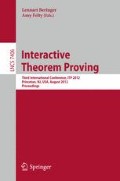Abstract
Proof tools in interactive theorem provers are usually developed within and tied to a specific system, which leads to a duplication of effort to make the functionality available in different systems. Many verification projects would benefit from access to proof tools developed in other systems. Using OpenTheory as a language for communicating between systems, we show how to turn a proof tool implemented for one system into a standalone tactic available to many systems via the internet. This enables, for example, LCF-style proof reconstruction efforts to be shared by users of different interactive theorem provers and removes the need for each user to install the external tool being integrated.
Access this chapter
Tax calculation will be finalised at checkout
Purchases are for personal use only
Preview
Unable to display preview. Download preview PDF.
References
Slind, K., Norrish, M.: A brief overview of HOL4. In: [18], pp. 28–32
Harrison, J.: HOL Light: An Overview. In: Berghofer, S., Nipkow, T., Urban, C., Wenzel, M. (eds.) TPHOLs 2009. LNCS, vol. 5674, pp. 60–66. Springer, Heidelberg (2009)
Arthan, R.: ProofPower manuals (2004), http://lemma-one.com/ProofPower
Wenzel, M., Paulson, L.C., Nipkow, T.: The Isabelle framework. In: [18], pp. 33–38
Kumar, R., Weber, T.: Validating QBF validity in HOL4. In: [19], pp. 168–183
Kunčar, O.: Proving valid quantified boolean formulas in HOL Light. In: [19], pp. 184–199
Weber, T., Amjad, H.: Efficiently checking propositional refutations in HOL theorem provers. Journal of Applied Logic 7(1), 26–40 (2009)
Blanchette, J.C., Bulwahn, L., Nipkow, T.: Automatic Proof and Disproof in Isabelle/HOL. In: Tinelli, C., Sofronie-Stokkermans, V. (eds.) FroCos 2011. LNCS, vol. 6989, pp. 12–27. Springer, Heidelberg (2011)
Hurd, J.: First-order proof tactics in higher-order logic theorem provers. In: Archer, M., Vito, B.D., Muñoz, C. (eds.) STRATA 2003, Number NASA/CP-2003-212448 in NASA Technical Reports, pp. 56–68 (September 2003)
Slind, K.: Reasoning about Terminating Functional Programs. PhD thesis, Technischen Universität München (1999)
Krauss, A.: Partial and nested recursive function definitions in higher-order logic. J. Autom. Reasoning 44(4), 303–336 (2010)
Hurd, J.: The OpenTheory Standard Theory Library. In: Bobaru, M., Havelund, K., Holzmann, G.J., Joshi, R. (eds.) NFM 2011. LNCS, vol. 6617, pp. 177–191. Springer, Heidelberg (2011)
Hurd, J.: OpenTheory: Package management for higher order logic theories. In: Reis, G.D., Théry, L. (eds.) PLMMS, pp. 31–37. ACM (August 2009)
Dennis, L.A., Collins, G., Norrish, M., Boulton, R.J., Slind, K., Robinson, G., Gordon, M., Melham, T.: The PROSPER Toolkit. In: Graf, S. (ed.) TACAS 2000. LNCS, vol. 1785, pp. 78–92. Springer, Heidelberg (2000)
Sutcliffe, G.: The TPTP World – Infrastructure for Automated Reasoning. In: Clarke, E.M., Voronkov, A. (eds.) LPAR-16 2010. LNCS, vol. 6355, pp. 1–12. Springer, Heidelberg (2010)
Rushby, J.: An Evidential Tool Bus. In: Lau, K.-K., Banach, R. (eds.) ICFEM 2005. LNCS, vol. 3785, p. 36. Springer, Heidelberg (2005)
Zimmer, J., Autexier, S.: The MathServe System for Semantic Web Reasoning Services. In: Furbach, U., Shankar, N. (eds.) IJCAR 2006. LNCS (LNAI), vol. 4130, pp. 140–144. Springer, Heidelberg (2006)
Mohamed, O.A., Muñoz, C., Tahar, S. (eds.): TPHOLs 2008. LNCS, vol. 5170. Springer, Heidelberg (2008)
van Eekelen, M., Geuvers, H., Schmaltz, J., Wiedijk, F. (eds.): ITP 2011. LNCS, vol. 6898. Springer, Heidelberg (2011)
Author information
Authors and Affiliations
Editor information
Editors and Affiliations
Rights and permissions
Copyright information
© 2012 Springer-Verlag Berlin Heidelberg
About this paper
Cite this paper
Kumar, R., Hurd, J. (2012). Standalone Tactics Using OpenTheory. In: Beringer, L., Felty, A. (eds) Interactive Theorem Proving. ITP 2012. Lecture Notes in Computer Science, vol 7406. Springer, Berlin, Heidelberg. https://doi.org/10.1007/978-3-642-32347-8_28
Download citation
DOI: https://doi.org/10.1007/978-3-642-32347-8_28
Publisher Name: Springer, Berlin, Heidelberg
Print ISBN: 978-3-642-32346-1
Online ISBN: 978-3-642-32347-8
eBook Packages: Computer ScienceComputer Science (R0)

